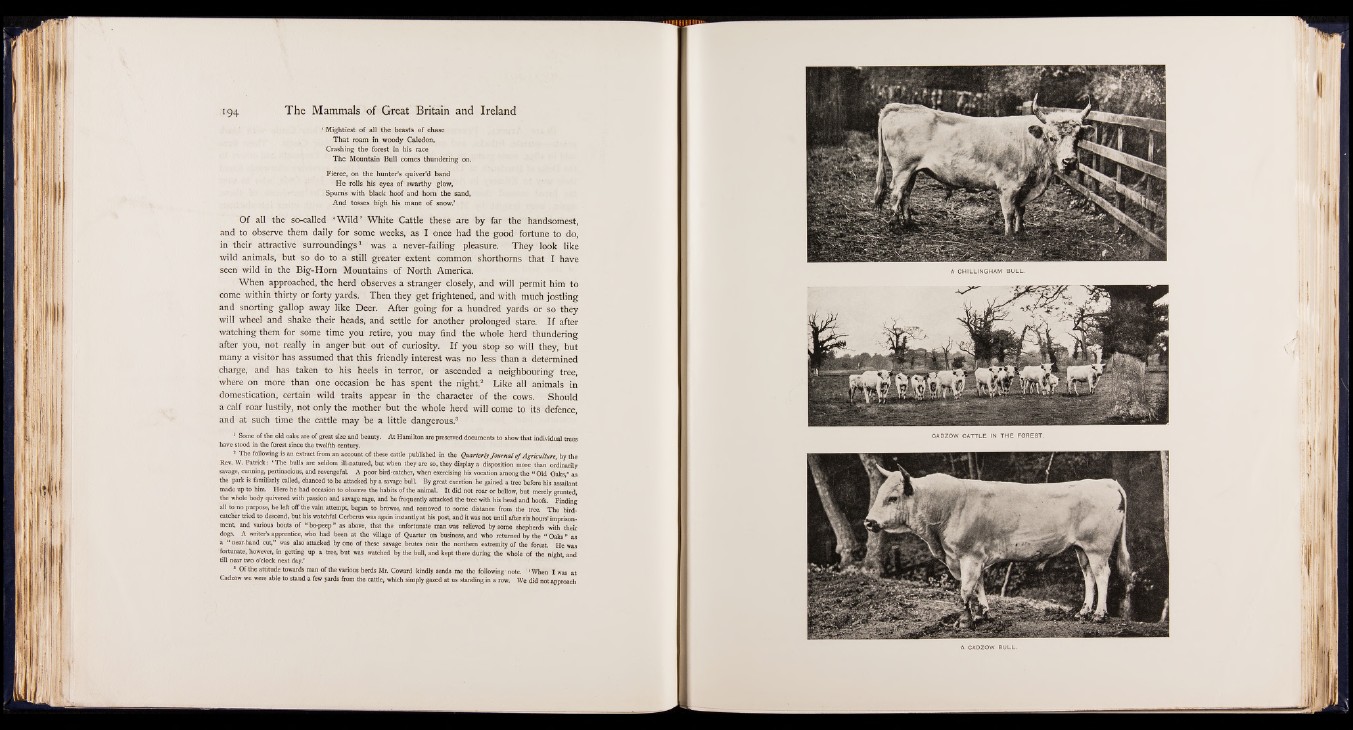
‘ Mightiest o f all the beasts o f chase
That roam in woody Caledon,
Crashing the forest in his race
The Mountain Bull comes thundering on.
Fierce, on the hunter's quiver’d band
He rolls his eyes o f swarthy glow,
Spurns with black hoof and horn the sand,
And tosses high his mane o f snow.’
Of all the so-called ‘Wild ’ White Cattle these are by far the handsomest,
and to observe them daily for some weeks, as I once had the good fortune to do,
in their attractive surroundings1 was a never-failing pleasure. They look like
wild animals, but so do to a still greater extent common shorthorns that I have
seen wild in the Big-Horn Mountains of North America.
When approached, the herd observes a stranger closely, and will permit him to
come within thirty or forty yards. Then they get frightened, and with much jostling
and snorting gallop away like Deer. After going for a hundred yards or so they
will wheel and shake their heads, and settle for another prolonged stare. I f after
watching them for some time you retire, you may find the whole herd thundering
after you, not really in anger but out of curiosity. I f you stop so will they, but
many a visitor has assumed that this friendly interest was no less than a determined
charge, and has taken to his heels in terror, or ascended a neighbouring tree,
where on more than one occasion he has spent the night.2 Like all animals in
domestication, certain wild traits appear in the character of the cows. Should
a calf roar lustily, not only the mother but the whole herd will come to its defence
and at such time the cattle may be a little dangerous.8
1 Some of the old oaks are of great size and beauty. At Hamilton are preserved documents to show that individual trees
have stood in the forest since the twelfth century.
a The following is an extract from an account of these cattle published in the Quarterly Journal o f Agriculture, by the
Rev. W. Patrick: ‘The bulls are seldom ill-natured, but when they are so, they display a disposition more than ordinarily
savage, cunning, pertinacious, and revengeful A poor bird-catcher, when exercising his vocation among the “ Old Oaks ” as
the park is familiarly called, chanced to be attacked by a savage bull. By great exertion he gained a tree before his assailant
made up to him. Here he had occasion to observe the habits of the animal. It did not roar or bellow, but merely grunted,
the whole body quivered with passion and savage rage, and he frequently attacked the tree with his head and hoofs. Finding
all to no purpose, he left off the vain attempt, began to browse, and removed to some distance from the tree. The bird-
catcher tried to descend, but his watchful Cerberus was again instantly at his post, and it was not until after six hours’ imprisonment,
and various bouts of “ bo-peep ” as above, that the unfortunate man was relieved by some shepherds with their
dogs. A writer’s apprentice, who had been at the village of Quarter on business, and who returned by the “ Oaks ” as
a “ near-hand cut,” was also attacked by one of these savage brutes near the northern extremity of the forest. He was
fortunate, however, in getting up a tree, but was watched by the bull, and kept there during the whole of the night, and
till near two o’clock next day.’
* Of the attitude towards man of the various herds Mr. Coward kindly sends me the following note. 'When I was at
Cadzow we were able to stand a few yards from the cattle, which simply gazed at us standing in a row. We did not approach
A CADZOW BULL.